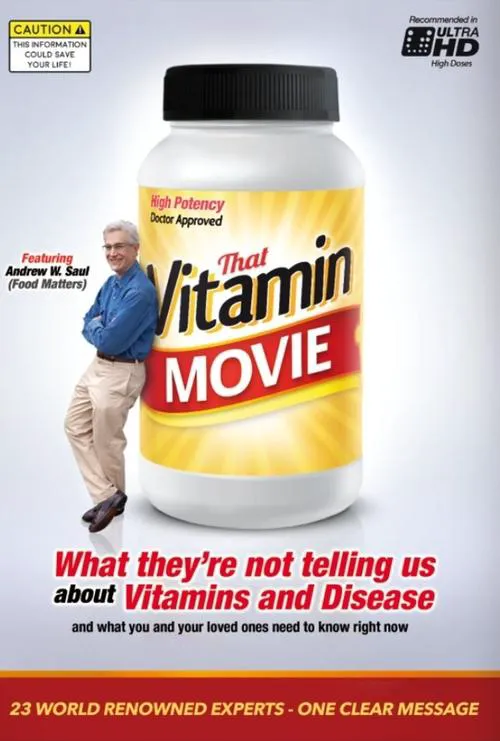That Vitamin Movie

Plot
In the documentary "That Vitamin Movie," filmmaker Zachary Bennett-Burton embarks on a journey to explore the impact of orthomolecular medicine on mental health. The film begins with Bennett-Burton's personal story, struggling with depression for many years, but then discovering a glimmer of hope when a friend shares with him the concept of orthomolecular medicine, as presented by speaker Andrew W. Saul in the documentary "Food Matters." Intrigued, Bennett-Burton decides to visit Saul, a renowned expert in the field of orthomolecular medicine. Saul explains to Bennett-Burton the principles of orthomolecular medicine, which involves using high doses of vitamins and minerals to treat various health conditions, including depression. Saul credits this protocol with revolutionizing his own mental health and that of countless others, drawing on insights from Nobel Prize winners and leading scientists. Bennett-Burton is particularly drawn to Saul's emphasis on the importance of individualized treatment, tailoring the specific needs of each patient according to their unique biochemical requirements. This resonates with Bennett-Burton's own experience, feeling like a standard approach to treatment had failed him in the past. As the documentary delves deeper into the world of orthomolecular medicine, Bennett-Burton meets various individuals who have reportedly benefited from the protocol. Among them is filmmaker Jeff Sutherland, who shares his own journey with depression and addiction, claiming that orthomolecular medicine had transformed his life. Another individual, Dr. Kelly Brogan, discloses her work as a holistic psychiatrist who has seen patients successfully recover from various mental health conditions with the aid of orthomolecular interventions. Bennett-Burton also encounters several outspoken experts, each contributing their perspectives on the relationship between nutrition, vitamins, and mental health. Dr. Jeffery J. Bland, a pioneer in the field, emphasizes the significance of biochemistry in shaping our experiences of mental health. Another prominent figure, Dr. Carolyn Dean, discusses her own experiences with mercury toxicity and the importance of removing these pollutants from our bodies to maintain overall health. While exploring the scientific underpinnings of orthomolecular medicine, Bennett-Burton delves into the history of the field, highlighting its roots in the work of pioneering researchers such as Roger Williams and Nobel laureate Linus Pauling. Their groundbreaking work laid the groundwork for the contemporary practice of orthomolecular medicine, which seeks to restore optimal levels of nutrients within the body to address a wide range of health concerns. Bennett-Burton's investigation is not without its challenges, however. He soon encounters criticism from some in the medical community, who perceive orthomolecular medicine as fringe or pseudoscientific. Some health professionals express skepticism that vitamins can be used in high doses to treat mental health issues, citing concerns about potential toxicity and the lack of rigorous clinical trials to support such a protocol. Undeterred by these reservations, Bennett-Burton continues to build a compelling case for the potential benefits of orthomolecular medicine. By sharing the personal stories of those who claim to have been helped, as well as insights from experts in the field, he presents a nuanced exploration of this approach to mental health. As Bennett-Burton nears the conclusion of his documentary, he invites the viewer to join him in exploring a new paradigm for treating mental health. He suggests that orthomolecular medicine offers a holistic alternative to conventional treatments, which often prioritize pharmaceuticals over dietary interventions. Ultimately, "That Vitamin Movie" presents a thought-provoking inquiry into the relationship between nutrition, vitamins, and mental health. It offers a platform for individuals to share their stories and highlights the work of pioneering researchers who have contributed to this area of study. By inviting viewers to consider an alternative approach to mental health, Bennett-Burton's documentary encourages a fresh examination of the possibilities within the realm of orthomolecular medicine.
Reviews
Recommendations




